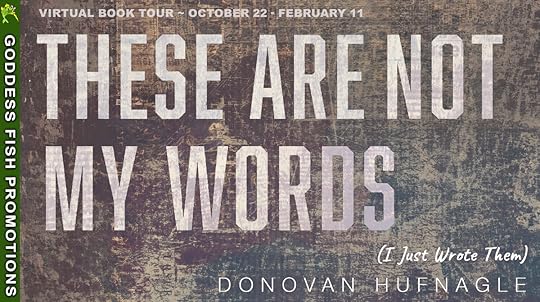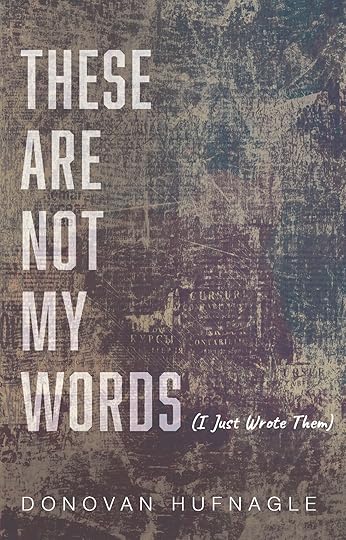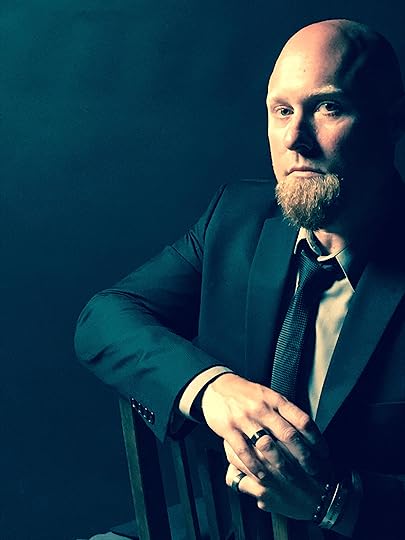THESE ARE NOT MY WORDS (I JUST WROTE THEM)

THESE ARE NOT MY WORDS (I JUST WROTE THEM)
Donovan Hufnagle
~~~~~~~~~~~~~
GENRE: Poetry
~~~~~~~~~~~~~
BLURB:
Echoing Chuck Palahniuk’s statement. “Nothing of me is original. I am the combined effort of everyone I’ve ever known,” this collection explores identity. These poems drift down rivers of old, using histories private and public and visit people that I love and loathe. Through heroes and villains, music and cartoons, literature and comics, science and wonder, and shadow and light, each poem canals the various channels of self and invention. As in the poem, “Credentials,” “I am a collage of memories and unicorn stickers…[by] those that have witnessed and been witnessed.”

~~~~~~~~~~~~~
EXCERPT
Refurbished
Susan taught me that poetic energy lies
between the lines, white noise scratching
and clawing between images, ideas,
things…
And like a poem,
the chair was molded by my Tio’s hands,
an antique wooden upholstered desk chair.
My Tio moved from Durango, Mexico
to Forth Worth in 1955.
He became a mason and wood worker.
He bricked the stockyards
He built the signs
He died in 2005.
Now,
matted. Worn. Faded floral design. Wood
scarred like healing flesh.
The arms torn, ratted by the heft of his arms
and the stress of the days. The foam peeks
out.
The brass upholstery tacks rusted. I count
1000 of them. With each,
I mallet a fork-tongue driver under its head.
A tap, tap, tapping until it sinks beneath the tack,
until the tack springs from its place.
I couldn’t help but think of a woodpecker.
A tap, tap, tapping into Post Oak,
a rhythm…each scrap of wood falling to the ground
until a home is formed.
Until each piece of wood like the tacks removed
shelter something new.
I remove the staples, the foam, the fabric,
the upholstery straps
until it’s bones.
I sand and stain
until its bones shine.
I layer and wrap its bones with upholstery straps,
foam, fabric, staples and tacks.
New tacks, Brass medallions
adorning the whole, but holding it
all together—
its bones
its memories,
its energy.
~~~~~~~~~~~~~

AUTHOR Bio and Links:
Donovan Hufnagle is a husband, a father of three, and a professor of English and Humanities. He moved from Southern California to Prescott, Arizona to Fort Worth, Texas. He has five poetry collections: These Are Not My Words (I Just Wrote Them), Raw Flesh Flash: The Incomplete, Unfinished Documenting Of, The Sunshine Special, Shoebox, and 30 Days of 19. Other recent writings have appeared in Tempered Runes Press, Solum Literary Press, Poetry Box, Beyond Words, Wingless Dreamer, Subprimal Poetry Art, Americana Popular Culture Magazine, Shufpoetry, Kitty Litter Press, Carbon Culture, Amarillo Bay, Borderlands, Tattoo Highway, The New York Quarterly, Rougarou, and others.
Website: http://www.donovanhufnagle.com
Instagram: https://www.instagram.com/donovanhufnagle
Facebook: http://www.facebook.com/dhufnaglepoetry
Amazon: https://www.amazon.com/These-Are-Not-My-Words/dp/B0DBMN46M4/ref=sr_1_1
~~~~~~~~~~~~~
RAFFLECOPTER GIVEAWAY
One randomly chosen winner via rafflecopter will win a $25 Amazon/BN.com gift card.
Enter to win a $25 Amazon/BN GC – a Rafflecopter giveaway
~~~~~~~~~~~~~
Q & A With …
Any weird things you do when you’re alone?
I debate myself. I pretend that I am debating someone about a controversial topic. Or rather, a topic I deemed essential and that the other person in this imaginary scenario disagrees with. I have verbal matches with a person (they are usually distortions of real people—family, friends, and associates) about a topic that probably has no significance in their or my world. I assume what their stance would be, and I make arguments on the contrary. Is that weird?
What is your favorite quote and why?
I have many, but I really like the repeated line from the Corrosion of Conformity song “Shelter.” The line is “Once in awhile you’d be better listening to the fools for a change.” I am not going to analyze the song, but for some reason I am reminded by one of my mentor’s discussions about Shakespeare and the “fools” in his plays. Though entertaining and maybe a comical retreat from the serious, the “fools” in Shakespeare’s plays are the characters to listen to the most. They are the truth speakers. If you ever want to know what’s happening in a Shakespearian play, listen to the fools. Anyway, I also like the idea that we are constantly bombarded by practical advice. I mean, I am a father of three, so I know how to give practical advice. But the advice from a fool might not be practical, and it could push you in an unexpected direction, which could be the best choice you have ever made.
Who is your favorite author and why?
I always struggle with this question. I have so many authors that I love and that have influenced my writing. From timeless writers such Robert Frost to contemporary authors such as George Saunders. I admire many contemporary writers such as Tyehimba Jess, Kim Addonizio, and the late CD Wright. My favorite novel is probably The Great Gatsby. From a writing standpoint, the most influential writer would probably be Langston Hughes. His thinking about language and musicality in his work has really connected with me. From an entertainment perspective, I enjoy the supernatural, so Anne Rice is one of my authors I read. I also enjoy dystopian works, so the classics 1984 or Fahrenheit 451 are in my wheelhouse.
What, in your opinion, are the most important elements of good writing?
Language. If anything, the words, and their meanings play the most important role. Its funny, I have the book What If by Anne Bernays and Pamela Painter on my desk right now. There are like 80+ writing exercises for fiction writers. They focus on beginnings, characterization, dialogue, plot, mechanics, and the like. All these factors are important, and, arguably, not one is more important than the other. But I love a writer, and any writer—fiction, nonfiction, and poetry—who has a poetic mindset with language. To think about each word and how that word plays a role in the narrative or whatever, and how that word plays with the next word holds a special place for me. For instance, I enjoy Sue Monk Kidd’s writing. The Mermaid Chair could be sectioned in literature rather than fiction.
Where did you get the idea for this book?
These Are Not My Words (I Just Wrote Them) has various meanings, personal and universal. The title came from the documentary miniseries The Staircase. The series was about Michael Peterson and his wife’s murder. In the scene when the defense is questioning the sister of the murder victim about the statement she previously gave to police, the defense lawyer reiterates her statement and asks, “Those were your words?” and her response was, “They weren’t my words, it is what I wrote.” I could not stop laughing and for several reasons. Prior to this, I would lightheartedly criticize how my wife would repeat what I just said but switch the language around to fit her needs. Anyway, after the staircase episode, I labeled this action “These are not my words, I just wrote them.” And I like to think my poetry does a similar thing—take a reality and translate it into both authenticity and art. I appreciate the art of documentary poetry, which may include found histories such as the poems in my book that use the WPA narratives from the 1930s. In the case of these poems, mostly, they aren’t my words, I just arranged and directed them, trying to highlight the emotional energy.
I am not inventing any words, at least, I don’t remember making up any new words or using any lost words in this book, so from a practical stance, I’m using someone else’s words in, hopefully, stimulating ways.



